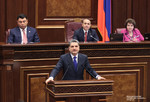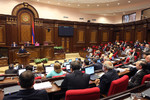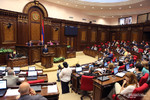Thursday, 23 May 2013
Prime Minister Tigran Sargsyan’s Concluding Remarks At National Assembly
Honorable Speaker of the National Assembly,
Dear MPs,
Dear citizens of the Republic of Armenia,
First of all, I wish to thank you all on behalf of the government for very interested and helpful discussions we had for these past three days.
It was not accidental that the speakers looked back at the path behind since faced with serious challenges, we are now looking ahead to the next 4-5 years in terms of what we are in for and what the country will look like upon completion of our program. From this perspective, I also want to reflect on our path.
Many of the attendees were with us in starting the nationwide movement of 1988. We have seen a lot over the past several years and should learn a lesson from the past.
I used to be on the Presidium of the Supreme Council. I was in the opposition for five years and learned on my own experience what Levon Zourabyan would call as the authorities’ cynicism, arrogance and anarchy. The number one lesson I have learned is as follows: the authorities must listen to the opposition, even if the latter is divided and weak. It is the responsibility of the authorities because the opposition puts forward ideas that might be useful.
Our duty is to see the point and rally for the sake of it. Instead, we may feel free in secondary things and be criticized.
The second lesson I have learned is the following: there cannot be a strong state without a strong opposition, first of all because a strong opposition may imply an alternative. The opposition must eye the future and propose programs, if they disagree with our programs. This means a debate over the future and we will all benefit from it. But if the opposition opts for a policy of mere accusations and slandering, it is a way toward the past rather than the future.
The third lesson is the following: the government must admit its own mistakes and shortcomings. It is a guarantee that we will get them right and go forward. But it does not mean that the opposition should blame us for what we have not done, ascribing to us ideas that we have not thought. This is not a good way to go.
The fourth lesson I have learned for myself is that the change in power is not the main problem in our country, dear Ruben. It is not the fundamental problem that we must address together with you. Instead, we should be looking for a vision of the future, conviction and will.
Who has a vision for the future, as well as confidence and will, he will be in power in the Republic of Armenia. And if we believe in our vision, we will have to describe the steps to take ahead. If we are to build a new Armenia, we must do what we have not done yet in order to get a new result. I mean that the challenges we face are not as trivial as one might think.
There are no simple solutions, dear colleagues. New challenges, new threats and risks will repeatedly come forth both on a global and regional level.
My fifth conviction and the next lesson that I have learned is as follows: no vision can be enforced without cooperation. At the same time, I agree with my colleagues that cooperation can not be imposed.
The preface of our program states that in drafting its program of activities, the Government of the Republic of Armenia proceeded from the electoral programs of our political parties, including those ideas available in the opposition’s programs that were are compatible with our ideas, as either this is a form of cooperation.
Our country’s President is a supporter of cooperation. This is the foundation of his political ideology. We are for joint action, we advocate building bridges between the government and the opposition. Our political leader has always voiced this idea in public speeches. And this is just the basis on which we must build the future.
The past 3 days ushered in a change of thinking on this floor. The revolution of thought was born in this hall and I am thankful to you for that.
Thank you.











